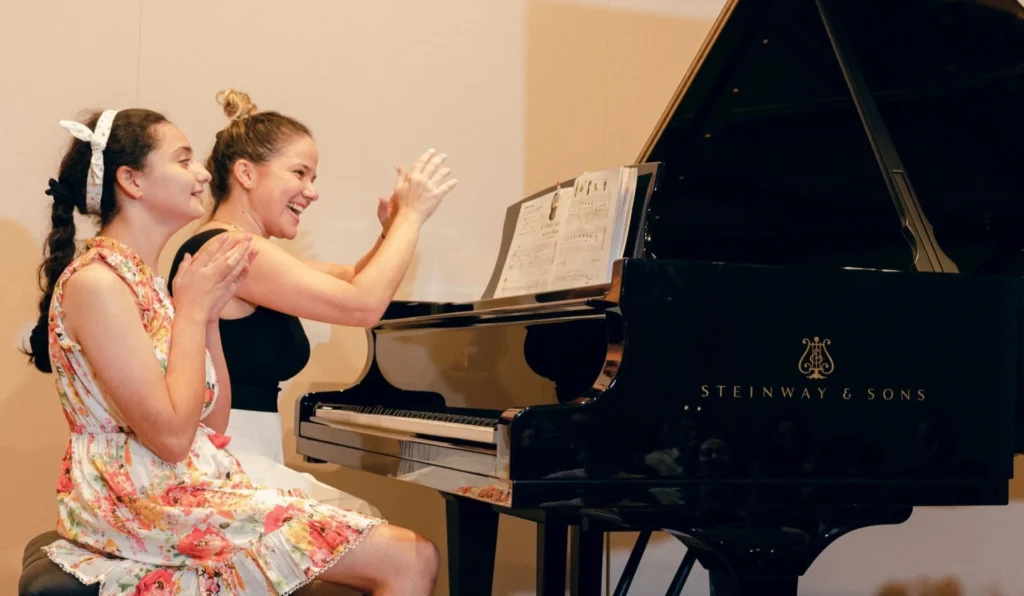From an early age, music does more than just enrich our lives; it shapes our minds, emotions, and overall development. But why is music education so important? It’s not just about learning to play an instrument—it’s a powerful tool for cognitive, emotional, and social growth. Research consistently shows that students engaged in music tend to excel academically and demonstrate enhanced creativity.
At our Music Institute in Dubai, we’ve witnessed firsthand the transformative power of music education. Even a few hours of music each week can significantly impact concentration, self-expression, and emotional well-being.
The benefits of music education
Whether you’re a parent looking for enriching extracurricular activities for your child or an adult eager to master an instrument, we’re here to guide you through the myriad benefits of music education, supported by our extensive experience and research.
Why Music Education Matters?
Music education plays a crucial role in holistic development. It enhances memory, reasoning skills, and overall cognitive function, which are vital for both academic and personal success. Studies show that students involved in music often excel academically, benefiting from improved concentration and creativity.
Cognitive and Social Advantages
Beyond cognitive gains, music fosters self-expression and teaches valuable life skills like time management and teamwork. Socially, it enriches cultural understanding, promoting empathy and appreciation for artistic diversity. If you’re interested in learning more about the importance of early music education and when it’s best to start, check out our article here.
Music as Therapy and Emotional Well-being
Music extends its influence beyond academics and social development by playing a critical role in therapy and emotional well-being. Research indicates that music therapy can significantly reduce stress, anxiety, and depression, offering a therapeutic outlet for people of all ages.
Integration of Music in the Academic Curriculum
Integrating music into the academic curriculum enriches students’ cultural appreciation and provides substantial benefits, especially for those seeking to strengthen their college and university applications. Music education offers a distinct advantage for students seeking academic credits.
Music and Academic Achievement
Studies reveal that students involved in music tend to perform better in standardized tests and exhibit higher levels of discipline and time management—skills highly valued by academic institutions.
Cultivating a Comprehensive Skill Set
Incorporating music into the curriculum enhances the educational experience and cultivates a broad skill set, including creativity, teamwork, and emotional intelligence. These skills improve academic performance and prepare students for future challenges.
Pathways to Success through Music
Whether through music theory classes, ensemble participation, or individual instrument instruction, integrating music into the academic journey provides students with a unique pathway to success. Discover how our educational offerings at Oohlala Fine Arts can enrich your child’s learning. Explore our plans and choose the best one for their musical and academic development!
The role of music in academic education and social development
Music education enriches children’s cultural lives and significantly impacts their academic development. Studies support the notion that learning music enhances performance in reading, mathematics, and language skills.
Strengthening Key Academic Skills
At our music academy in Dubai, we’ve observed how students engaged in music lessons show marked improvement in these areas. Regular practice not only strengthens memory and concentration but also hones problem-solving skills essential for academic success.
Social Development through Music
Music serves as a powerful tool for social development, teaching children the value of hard work, persistence, and personal responsibility. These traits translate into better academic performance and prepare children to tackle life’s challenges, fostering a strong work ethic and positive self-esteem.
Creativity and Self-Expression in Music
Creativity and self-expression are fundamental aspects of music education. Music allows children to explore and express their emotions uniquely and creatively.
Developing Artistic Identity
Through musical composition, improvisation, and performance, children develop their artistic identity and gain confidence in their abilities. This sense of self-expression fosters personal achievement and creates an enriching and stimulating learning environment.




